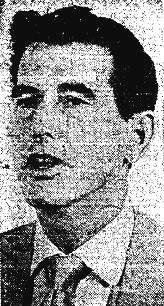Baxter's Choo-Choo
 Baxter Ward -- TV newsman and Los Angeles County supervisor from 1972 to 1980 -- was born on this day in 1919 in Superior, Wisconsin.
Baxter Ward -- TV newsman and Los Angeles County supervisor from 1972 to 1980 -- was born on this day in 1919 in Superior, Wisconsin.A swaggering, silver-throated anchorman and news director at KHJ, KCOP and KABC-TV in Los Angeles, Ward ran unsuccessfully for mayor of Los Angeles against Mad Sam Yorty in 1969, but ultimately won election as a supervisor representing the Santa Clarita area in 1972. He became a vocal supporter of a $7-billion light rail system in Los Angeles. To diffuse the issue, Ward's fellow supervisors approved the $2-million purchase of an old train for refurbishing as a commuter train, which came to be derisively known as "Baxter's Choo-Choo."
The hopeless concentrations of cars on Southern California highways and carbon monoxide in Southern California skies at the end of the 20th century were nightmares-come-true, as predicted by Ward in the 1970s. By 1987, traffic saturations had forced the County to move forward on an $877 million, 22-mile light rail system, the Blue Line, which finally opened in 1990. By 2004, the Los Angeles County MTA was operating 73 miles of light rail public transportation services, at an overall construction and operating cost of $3.2 billion.
Nevertheless, Southern California remains a car culture. Worse yet, the 2001 Long Range Transportation Plan for Los Angeles County observes that in the next 25 years, the population of Los Angeles County is expected to increase by between 2.7 and 3.5 million people, increasing the time spent in daily trips on Los Angeles County streets and freeways by 30 percent. The Plan also recognizes that $94.8 billion that was already committed toward transportation projects in Los Angeles County through 2025 was not enough to solve the future capacity needs, and that even the unfunded projects proposed in the Plan will result in peak highway speeds of less than 20 miles per hour.
Ward passed away in 2002, having retired to the Seattle area -- but you can bet that if he were still around LA today, on TV or in the County chambers, he wouldn't be missing any opportunities to remind Los Angelenos to face up to worsening traffic and air quality conditions amid explosive population growth, and that putting off the spending now only makes it worse later.
Labels: American Politicians, Journalism, Southern California, Urban Policy





0 Comments:
Post a Comment
Subscribe to Post Comments [Atom]
<< Home